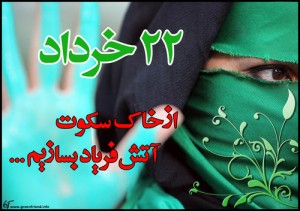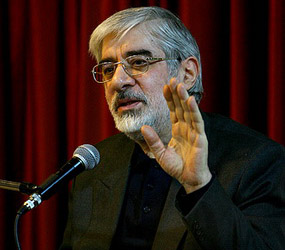
2100 GMT: The Executions (Arresting the Students Special).
RAHANA reports, "At least 15 female and male students have been arrested since Tuesday May 11, in Marivan [in Kurdistan], and taken to unknown locations. The arrests follow two days of rallies at Payam Nour University in Marivan as well as widespread calls for a province-wide strike on May 13 over the execution of 5 political prisoners."
2050 GMT: The Executions. The Iranian Independent Workers Union has issued a
statement on the hanging of teacher Farzad Kamangar: "Execution of Farzad and other political prisoners will only add hatred and disgust of workers, teachers, and all Iranian’s towards the current situation more than ever. Freedom seeking shouts of Farzad will turn into screams of million teachers, workers and students to achieve a society free of death penalty."
And the
Tehran Bus Workers Union declares, "We are mourning a teacher whose equipment was chalks and pens, one who taught kids, many of whom put their heads hungry on their pillows at night. His crime was standing for human rights."
NEW Iran Update: The Aftermath of the Executions
NEW Iran Document: Maziar Bahari’s Response to His 13-Year (and 74-Lash) Sentence
NEW Iran Special: A Renewal of Protest for 12 June?
The Latest from Iran (11 May): Opposition Surfaces
2040 GMT: Economy Watch. With the Ahmadinejad subsidy cuts imminent, a sign of things to come?
Khabar Online reports:
During the last days, some gas stations in Tehran have installed notices saying they lack unsubsidized gasoline. The announcements have caused the bewilderment of customers who can not meet their demands by rationed gasoline.
As the gas stations avoid selling unsubsidized gasoline, the head of Iran's Association of Gas Station Owners declares that the problem is due to the shortage of "special unsubsidized gasoline cards".
Khabar adds the pointed fact, "Lacking sufficient oil refineries, Iran imports 40 percent of its gasoline for local consumption." 2030 GMT: More on the Karroubi Statement (1515 GMT). In his meeting with the family of the imprisoned journalist Ali Malihi, Mehdi Karroubi
focused on the Government's loss of legitimacy because of transgressions and abuses: “They have not yet resolved the cases of Kahrizak Prison and the sexual abuses; the ambiguities surrounding that case still exist and they are increasing." Karroubi continued:
Lack of trust it at its lowest point ever, and the regime’s behaviour is such that an unprecedented crack has emerged between the people and the state. I swear to God we never thought country’s fate would turn out to be this way ... The people are moving in one direction and the state in another
1840 GMT: Political Prisoner Watch. Arsalan Abadi, an engineering student at Qazvin International University,
has been sentenced to 9 1/2 years in prison.
1830 GMT: Mousavi's Latest. Mir Hossein Mousavi,
speaking with Rah-e-Sabz, has emphasised that the Green Movement is a peace movement", supporting the Iranian people's demands for fulfillment of the Constitution.
Mousavi criticised the lack of independence in Iran's judiciary, said that reform depends on a free media, and noted the torture of and forced confessions from detainees.
1740 GMT: The Executions. A reader points us to
Fars News' article with further details of the "case of the five terrorists", found guilty of bombing of centres of government and the people of Iranian cities.
1515 GMT: Is Human Life This Cheap? Mehdi Karroubi, visiting the family of a detained journalist,
has asked, "Is human life so cheap that one can take it so easily, without the slightest legal consideration and hidden from the public?" He continued, ""When human life becomes so cheap that they [the authorities] open fire on people on the street only because of some civil protest, then such behaviour is not so much out of the norm."
Asked about a statement by Gholam-Hossein Elham, a member of the Guardian Council, that Mir Hossein Mousavi is pursuing "mohareb" (war against God), Karroubi replied: "We should cry for Islam that Elham and his disciples have become its spokesmen. "
1320 GMT: Rafsanjani Watch. Faezeh Hashemi, the daughter of former President Hashemi Rafsanjani,
has declared that those who have to be purified are "those who stand against the law, people and religion, not me".
1315 GMT: Executions. Muhammad Sahimi has a long article in
Tehran Bureau, "Capital Punishment, Capital Fear", pulling together the strands of information on
Sunday's executions and their aftermath.
1300 GMT: Diversion. Amidst the internal tension and developments,
today's Presidential distraction....
"You should know that your resolutions are not worth a penny," Ahmadinejad said in a message to the big powers.
"If you think that by making fuss and propaganda you can force us to withdraw, you are wrong. The Iranian nation will not withdraw even one inch from its stance," he said in a speech to a crowd in southwestern Iran.
1230 GMT: The Family of the Executed.
Fereshteh Ghazi updates on alleged regime harassment of the family of Shirin Alamhouli, executed on Sunday (see 1130 GMT). Alamhouli's sister and mother are reportedly out on bail, but Ghazi says her grandfather, uncle, and cousin have now been arrested and are held in the Ministry of Intelligence. The family's phone has been disconnected since yesterday., the house is surrounded, and a curfew is in place.
1215 GMT: Political Prisoner Watch. Fereshteh Ghazi has
a full account of Sunday's trial of Mohammad Davari, the imprisoned editor of Mehdi Karroubi's
Saham News, with Davari's statement, “They want to sacrifice someone over the issue of raping detainees, and didn’t find anyone better than me.”
Davari was arrested on 26 September when the headquarters of Karroubi's Etemade Melli party were raided, less than two months after Karroubi publicly raised allegations of abuse and rape of post-election detainees. The Official charges against Davari include “disseminating propaganda against the regime" and "conspiracy to disrupt national security and public order".
Davari's lawyer, Mina Jafari said that her client, who is reportedly in poor health, is under pressure to confess against Mehdi Karroubi but has refused to do so.
According to Jafari, Davari said at his trial on Sunday, "In the past 8 months in prison, I judged my own actions more than you judged them, and I concluded that I didn’t do anything to discredit the regime. In fact, all of my actions added to the regime’s credibility.” The lawyer asked Karroubi to intervene to seek Davari's freedom.
1130 GMT: The Executions. Nazila Fathi of
The New York Times follows up this morning on her reporting of Sunday's executions of five Iranians.
The centrepiece is an interview with Khalil Bahramian, lawyer for the three of the five slain prisoners. Bahramian said that authorities are refusing to release the bodies and asserted, in line with reports from the family, that the sister and mother of the executed Shirin Alamhouli, were arrested at their home in northwestern Iran. (They were later reportedly released on bail.) He also said the family was not aware of the execution until Monday afternoon.
Bahramian noted, “They [the authorities] even turned down my request to allow the families to be present while they are burying them [the executed].”
Fathi also draws from
Rah-e-Sabz to report that Abdoljabar Karami, member of Parliament for Sanandaj, the capital of Iranian Kurdistan, was threatened by the provincial governor when he tried to stop the executions and was unable to secure the release of the bodies.
1025 GMT: Political Prisoner Watch.
Peyke Iran claims that Hossein Rassayian, physics professor at Qazvin International University and a Mir Hossein Mousavi supporter, has been arrested.
1020 GMT: The Executions. Human Rights Activists News Agency claims that authorities are trying to
arrest members of the family of Farzad Kamangar, one of the 5 Iranians put to death on Sunday.
1010 GMT: Political Prisoner Watch.
Rah-e-Sabz offers
a round-up amidst summons of bailed protesters to return to the courts.
Zahra Jabbari has been acquitted of "mohareb" (war against God), but human rights activist Abolfazl Abedini has been sentenced to 11 years in prison. Emaduddin Baghi, Badressadat Mofidi, and other journalists are seriously ill and need medication.
Baghi's lawyer, Hassan Ali Abutalebi
has contrasted the treatment of his client with that of
Kayhan editor Hossein Shariatmardari, acquitted of all charges of libel earlier this week.
0945 GMT: President Be Gone? Ezzatollah Sahabi, former minister and member of Parliament, editor of the banned journal
Iran-e Farda, and leader of Iran’s Nationalist-Religious political alliance, makes the declaration --- published in both
Rah-e-Sabz and
Khabar Online --- that the dismissal of President Ahmadinejad is necessary to preserve Iran and the Islamic Republic.
Reformist member of Parliament Darius Ghanbari has said that
the prolongation of Ahmadinejad's presidency "is a joke" and the characteristic of his government is that "it doesn't tolerate critique".
0825 GMT: Dealing with Detainees.
Writing in The National, Michael Theodoulou draws from our analysis to assess that the three detained US hikers, and the Iranian decision to allow their mothers to see them, are linked to Tehran's manoeuvres with the US over Iran's nuclear programme: "Hikers Seen as Bargaining Chips".
0815 GMT: On the International Front. Speaker of Parliament Ali Larijani
has returned from Turkey and the meeting of the Organisation of the Islamic Conference with the declaration that a Qods Committee on Palestine will be established and assertion of agood relationship with Turkey, but with not a word on uranium enrichment.
Following a pattern, President Ahmadinejad
has used a speech to look away from internal matters, asking, "Who is Israel to stand against us?" and declaring, "No one will attack us, there is nobody."
0530 GMT: Responding to the Defence of the Indefencible. I had not posted my response to
the latest column of Flynt and Hillary Mann Leverett, using an attack on Nazila Fathi of
The New York Times to maintain "official justifications" of Sunday's executions, as I did not wish to offer any oxygen for their views. Instead I had commented in a personal capacity on other websites and in discussion with members of Gulf 2000.
I have asked by readers, however, to post my response:
In the spirit of the intellectual honesty that the Leveretts claim, I note that they --- in the guise of an attack on Nazila Fathi's journalistic honesty --- have defended the "official justifications" of Iranian state media over Sunday's execution of 5 Iranians, denying any substantiated claims of the deprivation of human rights.
I therefore offer extracts of and links to only a few of many pieces of evidence for consideration:
"Khalil Bahramian, Kamangar’s lawyer, said: 'Nothing in Kamangar’s judicial files and records demonstrates any links to the charges brought against him.'
Bahramian, who was present during the closed-door court hearing, described it as 'lasting no more than five minutes, with the Judge issuing his sentence without any explanation and then promptly leaving the room'. He added, I have seen absolutely zero evidence presented against Kamangar. In my forty years of legal profession, I have never witnessed such a prosecution.'"
2. "Khalil Bahramian, Kamangar’s attorney, in an interview before knowing about the execution said: 'Mr. Kamangar and his interrogator told me that there are changes in the case and under review by the prosecutor and execution is out of the question. I inquired more than ten times and they told me the case is under review. But the intelligence officer had told Farzad that execution had been revoked.' Later being notified of the execution after the fact, Bahramian said in an interview: 'The rules call for notification of the lawyers on carrying out the death penalty. In case of two of my clients, Farzad Kamangar and Mehdi Eslamian, I was not notified at all.'"
3. "Mehdi Islamian's brother was executed last year, convicted of cooperation with the Monarchist Group. Mehdi was convicted of giving financial aid to his brother before his arrest."
4. The last letter of Farzad Kamangar before his execution
5. The last letter of Shirin Alamhouli before her execution
In the spirit of intellectual honesty, and more importantly in the spirit of respect for human rights, I ask the Leveretts to set aside their diversionary attack on Nazila Fathi and to provide evidence, beyond the official account of Fars News and the Islamic Republic News Agency, that due process was followed from arrest to execution in the case of these five Iranians.
(The Leveretts have subsequently replied on Gulf 2000 --- the first time they have ever engaged with my comments --- without providing any evidence on the case, and I have responded.)
0425 GMT: Culture Corner. Golnaz Esfandiari of Radio Free Europe/Radio Liberty
reports on "Banned Music Banned":
Rasul Abbasi, the director-general for transportation and traffic coordination of Iran's municipalities, has told the Borna news agency that taxi drivers are not allowed to play banned music in their taxis.
Abbasi said that if they did so, they would be dealt with according to the law, which could lead to the cancellation of their taxi permit and confiscation of their cars.
The Iranian official added that the law in this regard has not been implemented for the past few years. He called on the managers of organizations supervising taxis in Iran to oversee the performance of their drivers.
Moshtaq, a taxi driver in Tehran, commented on the announcement:
It is one of the most important human rights for one to be able to choose what he listens to and no one has the authority to determine that. What would one want to listen to in his free time, for instance, whether banned or not. Who is the one to actually decide what should be banned and what should not? On what basis is this determined?
0420 GMT: While looking for further signs of the political fallout from Sunday's executions of five Iranians, we post
an update on the latest developments.
 Friday, May 28, 2010 at 14:14
Friday, May 28, 2010 at 14:14  1410 GMT: Political Prisoner Watch. Omid Sharifi-Dana, arrested just after the Ashura protests of 27 December, has been sentenced to six years in prison.
1410 GMT: Political Prisoner Watch. Omid Sharifi-Dana, arrested just after the Ashura protests of 27 December, has been sentenced to six years in prison. Alireza Nourizadeh,
Alireza Nourizadeh,  Ayatollah Javadi-Amoli,
Ayatollah Javadi-Amoli,  Etemade Melli,
Etemade Melli,  Fatemeh Haghighatjoo,
Fatemeh Haghighatjoo,  Hashemi Rafsanjani,
Hashemi Rafsanjani,  Heydar Moslehi,
Heydar Moslehi,  Iran,
Iran,  Islamic Republic of Iran Broadcasting,
Islamic Republic of Iran Broadcasting,  Mahmoud Ahmadinejad,
Mahmoud Ahmadinejad,  Majid Tavakoli,
Majid Tavakoli,  Mehdi Karroubi,
Mehdi Karroubi,  Mir Hossein Mousavi,
Mir Hossein Mousavi,  Omid Sharifi Dana,
Omid Sharifi Dana,  Peyke Iran,
Peyke Iran,  Rah-e-Sabz,
Rah-e-Sabz,  Seyed Mohammad Marandi,
Seyed Mohammad Marandi,  Turkey,
Turkey,  Zahra Rahnavard in
Zahra Rahnavard in  Middle East & Iran
Middle East & Iran 



